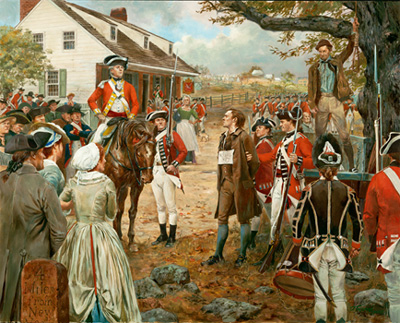Nathan Hale was born in Connecticut in 1755. Upon graduation from Yale at age 18, he took a teaching position in New London, CT. Less than 2 years later, when the American Revolution began with the battles of Lexington and Concord, Hale immediately enrolled in the local militia.
By late 1776, when the British had captured New York City, the young man was a captain in the Patriot army. And when George Washington needed someone to go behind enemy lines and discover what they were planning, Nathan Hale, age 21, bravely volunteered.
Disguised as a schoolteacher, he was able to cross to Long Island, obtain and record the needed information, hiding his notes in the soles of his shoes. Heading back, he made it past all the British guards but the last ones. They searched Hale, found his secret papers and arrested him.
Captured on the night of September 21st, Captain Nathan Hale was hung by the British for the crime on espionage the following day, September 22nd, 1776. The following account was recorded by Captain William Hull of the Continental Army ~
Sir William Howe, without the form of a trial, gave orders for his execution the following morning. He was placed in the custody of the Provost Marshal, who was a refugee and hardened to human suffering and every softening sentiment of the heart. Captain Hale, alone, without sympathy or support, save that from above, on the near approach of death asked for a clergyman to attend him. It was refused. He then requested a Bible; that too was refused by his inhuman jailer.
‘On the morning of his execution,’ continued the officer, ‘my station was near the fatal spot, and I requested the Provost Marshal to permit the prisoner to sit in my marquee, while he was making the necessary preparations. Captain Hale entered: he was calm, and bore himself with gentle dignity, in the consciousness of rectitude and high intentions. He asked for writing materials, which I furnished him: he wrote two letters, one to his mother and one to a brother officer.’ He was shortly after summoned to the gallows. But a few persons were around him, yet his, characteristic dying words were remembered. He said, ‘I only regret that I have but one life to lose for my country.’”





